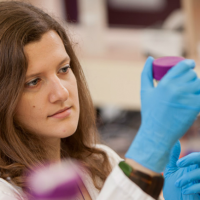Neuroscience (MSc)
Length of program
Mode of delivery
Program consists of:
- Thesis
- Coursework
- Co-op (optional)
Campus
Intake
Related programs
Program description
We offer a research-based training program. Graduate students work closely with faculty on research projects, learning how to design, conduct, analyze experiments. Students will also learn to present their work, both in written and oral formats. One particular strength of our department is “behavioural neuroscience” which focuses on the relationship between brain and behavior. Research topics in our department are diverse, including animal social behavior, learning and memory, decision making, addiction, developmental plasticity (including the effects of brain injury, stress and drugs on brain development), neural coding, motor control, comparative neuroanatomy, comparative behavioural analysis, attention, and robotics.
The Neuroscience program is part of the Canadian Centre for Behavioural Neurosience. Our facilities include:
- a wide range of apparatus for studying animal behavior, including water mazes, radial mazes and operant chambers
- microscopes for the analysis of neural tissue, including confocal microscopes, high resolution slide scanners, an electron microscope, as well as standard light microscopes.
- set-ups for in-vivo imaging at both macroscopic and microscopic scales
- a dedicated molecular biology lab for cellular imaging using immunohistochemistry and in-situ hybridization
- a dedicated Western blot biology lab
- nuclear magnetic resonance imaging suitable for metabolomic analysis
- Six high density multi-channel recording systems for parallel single-cell electrophysiology and local field potential studies in awake behaving animals
- A high-performance parallel computer cluster
- A high-density human electroencephalography (EEG) recording system
- A new 3T human MRI
- A 4T animal MRI
- extensive video analysis facilities, including a Peak Performance motion analysis system
Finding a supervisor
Students are required to secure a potential supervisor prior to submitting an application for this program. For further information please visit our Search Supervisors page.
Career pathways
A graduate degree in neuroscience offers students an in-depth understanding of brain function, hand-on experience with a variety of experimental methods, the ability to analyze and interpret data, the ability to critically evaluate scientific studies, and writing and presentation skills.
These skills prepare students for a variety of careers including:
- college and university teaching
- academic research
- industry based research, such as within a pharmaceutical company
- science-related policy and planning positions within government or non-governmental non-profit organizations (NGOs)
- secondary-level science education
- careers in health profession including rehabilitative therapist, audiologist, optometrist, EEG technician
- doctor of medicine, dentistry, or veterinary medicine
With further training, a neuroscience graduate degree may also prepare students for:
- secondary-level science education
- careers in health profession including rehabilitative therapist, audiologist, optometrist, EEG technician
- doctor of medicine, dentistry, or veterinary medicine

If we can understand the mechanics of what’s going on at the base molecular level in the brain, we could be better enabled to find ways to help people who, after having chemotherapy, suffer these side effects.
Anna Kovalchuk (BSc ’14)